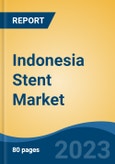Speak directly to the analyst to clarify any post sales queries you may have.
10% Free customizationThis report comes with 10% free customization, enabling you to add data that meets your specific business needs.
Stents serve as vital medical tools in addressing a range of healthcare conditions characterized by constricted or obstructed passages within the body. Some common applications of stents include the treatment of Coronary Artery Disease (CAD), Peripheral Artery Disease (PAD), Aneurysm Repair, Biliary and Pancreatic Obstruction, Urological Disorders, Gastrointestinal Conditions, Airway Obstruction, Dialysis Access, Esophageal Disorders, and Tracheobronchial Conditions. Particularly in the context of CAD, stents play a pivotal role in restoring blood flow to the heart by being implanted in narrowed or blocked coronary arteries during procedures like percutaneous coronary intervention (PCI) or angioplasty. This prevents artery collapse and ensures sufficient oxygen and nutrient supply to the heart muscle, consequently alleviating symptoms such as chest pain and shortness of breath.
Moreover, the implementation of drug-eluting stents has been instrumental in inhibiting cell growth within arteries, thereby reducing restenosis, the re-narrowing of previously treated arteries after angioplasty. This advancement, coupled with complementary medical therapies, enhances long-term outcomes for individuals with CAD, curbing disease progression and minimizing the need for repeat procedures. Stent placement, a minimally invasive procedure involving a small incision, generally yields shorter hospital stays, quicker recovery, and lesser discomfort compared to open-heart surgery. The customization of stents to match patients' arterial specifics contributes to precise placement and optimal treatment outcomes, further driving demand for the Indonesia Stent Market and fostering growth.
Key Market Drivers:
1. Escalating Cardiovascular Disease Burden: The growing prevalence of cardiovascular diseases, notably CAD, fuels demand for medical interventions like stents. As the number of individuals with such conditions rises, so does the requirement for stent procedures. Research and development efforts in stent technology are stimulated, leading to advanced stent designs, materials, and drug-eluting capabilities tailored to complex cardiovascular cases.2. Technological Advancements: Innovations in medical technology impact stent design, efficacy, safety, and availability. Improved stent designs, drug-eluting stents, bioabsorbable stents, nanotechnology coatings, 3D printing, and minimally invasive techniques contribute to better patient outcomes and drive adoption.
3. Increasing Healthcare Expenditure: Greater healthcare spending translates to improved access to advanced medical technologies, such as stent interventions. Enhanced healthcare facilities and expanded health insurance coverage make stent procedures accessible to more patients. Medical tourism is also boosted, driving demand for stent procedures and cardiovascular interventions.
Key Market Challenges:
1. Economic Constraints: Limited healthcare budgets and financial challenges can impede patient access to stent procedures. Economic limitations may result in delayed or deferred stent procedures, impact healthcare infrastructure, and discourage research and development of innovative stent technologies.2. Regulatory Challenges: Complex and lengthy regulatory approval processes can delay the introduction of new stent technologies. Stringent requirements may limit the market's stent variety and deter investment in research and development. Inconsistent or unclear regulations create uncertainty, hindering the adoption of new stent technologies.
Key Market Trends:
1. Minimally Invasive Procedures: The rise of minimally invasive procedures, such as stent placement, offers advantages like quicker recovery, reduced complications, and patient preference, driving demand for stent interventions.2. Product Type and Material Type Dominance: The vascular stent segment, particularly drug-eluting stents, and metal stents are dominant in the market, fueled by their clinical efficacy in treating cardiovascular diseases.
Regional Insights:
Bali leads the Indonesia Stent Market due to its strong demand for medical devices and advanced healthcare infrastructure. Cities like Jakarta, Surabaya, Bandung, and Denpasar are known for their healthcare facilities, resulting in higher utilization of medical devices and driving market growth.Key Market Players
- PT B. Braun Medical Indonesia
- PT Boston Scientific Indonesia
- PT Medtronic Indonesia
- PT Becton Dickinson Indonesia
- PT Abbott Indonesia
- PT Multidaya Medika
- PT Terumo Indonesia
Report Scope:
In this report, the Indonesia Stent Market has been segmented into the following categories, in addition to the industry trends which have also been detailed below:Indonesia Stent Market, By Product Type:
- Vascular Stent
- Non-Vascular Stent
Indonesia Stent Market, By Material Type:
- Metal
- Polymer
Indonesia Stent Market, By End User:
- Hospital & Clinics
- Ambulatory Care Centers
- Others
Indonesia Stent Market, By Region:
- Bali
- Java
- Kalimantan
- Sulawesi
- Indonesian Papua
- Sumatra
- Nusa Tenggara
- Moluccas
Competitive Landscape
Company Profiles: Detailed analysis of the major companies present in the Indonesia Stent Market.Available Customizations:
Indonesia Stent Market report with the given market data, the publisher offers customizations according to a company's specific needs.This product will be delivered within 1-3 business days.
Table of Contents
Companies Mentioned
- PT B. Braun Medical Indonesia
- Pt Boston Scientific Indonesia
- PT Medtronic Indonesia
- PT Becton Dickinson Indonesia
- PT Abbott Indonesia
- PT Multidaya Medika
- PT Terumo Indonesia
Table Information
| Report Attribute | Details |
|---|---|
| No. of Pages | 80 |
| Published | October 2023 |
| Forecast Period | 2023 - 2028 |
| Estimated Market Value ( USD | $ 126.07 Million |
| Forecasted Market Value ( USD | $ 171.22 Million |
| Compound Annual Growth Rate | 5.3% |
| Regions Covered | Indonesia |
| No. of Companies Mentioned | 7 |








